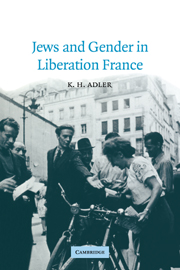Book contents
- Frontmatter
- Contents
- List of illustrations
- Abbreviations
- Acknowledgements
- 1 Introduction: the long liberation
- 2 Narrating liberation
- 3 Anticipating liberation: the gendered nation in print
- 4 Limiting liberation: ‘the French for France’
- 5 Controlling liberation: Georges Mauco and a population fit for France
- 6 Liberation in place: Jewish women in the city
- 7 Conclusion
- Notes
- Bibliography
- Index
- Studies in the Social and Cultural History of Modern Warfare
5 - Controlling liberation: Georges Mauco and a population fit for France
Published online by Cambridge University Press: 04 July 2009
- Frontmatter
- Contents
- List of illustrations
- Abbreviations
- Acknowledgements
- 1 Introduction: the long liberation
- 2 Narrating liberation
- 3 Anticipating liberation: the gendered nation in print
- 4 Limiting liberation: ‘the French for France’
- 5 Controlling liberation: Georges Mauco and a population fit for France
- 6 Liberation in place: Jewish women in the city
- 7 Conclusion
- Notes
- Bibliography
- Index
- Studies in the Social and Cultural History of Modern Warfare
Summary
For Georges Mauco, a renaissance man during the renaissance française, the liberation appears at first glance to have been transformative. Until recently, Mauco was claimed as the major expert on immigration in the 1930s. He combined this expertise with interests in population, education and psychoanalysis. All were situated within a belief in the necessary defence of France — as place, as civilization and as idea. We have already explored the populationist principles that informed the scientific and political terrain on which the reconstruction of France was to take place after liberation. We concluded that the formation of, and conformity to, a set of ethnicized and gendered relationships to the nation were prerequisite for an individual to be considered properly French. Here, the construction of these relationships is explored in greater depth through the institutions with which Mauco was associated, and his published and unpublished texts. Beyond his work on immigration, Les Etrangers en France, published in 1932, little attention was paid to Mauco before the 1990s. Towards the end of the twentieth century, his expertise and role in the administration started to come under greater scrutiny. These discussions reflected increased recognition of Mauco's importance as an individual, as well as of changing conceptualizations of political history that was now more inclined to address the inner structures and discourses of government and policy than was formerly the case. The years 1940 to 1944 were absent from Mauco's official curriculum vitae.
- Type
- Chapter
- Information
- Jews and Gender in Liberation France , pp. 106 - 143Publisher: Cambridge University PressPrint publication year: 2003



